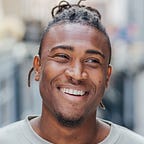My dreadlocks symbolise my journey to accepting who I am
Tuck your shirt in, fix your tie, listen to your teachers, keep your hair short and well trimmed. Coming from an African island that was formerly a Portuguese colony, these are instructions I would hear regularly from my mum and my family. In fact, at one point I took pride in ticking all of the above boxes during my secondary school years, in London.
I became convinced natural black hair wasn’t good enough
As a child I remember being praised for getting good grades, always having my hair neatly combed and generally being polite to others. Most of the above are good things to be praised for. Often the praise came from other black relatives. Days in which I would choose to not comb my hair, there was a culture, particularly amongst the boys my age of pointing out natural black hair as being almost comical. A more commonly known term used by American black folks is ‘nappy hair’.
Young black girls would wear an assortment of weaves, which is essentially artificial or human hair integrated with the wearer’s natural hair. Young black boys would pride themselves in their ‘fresh trim’.
Once, a black boy from my school forcibly pulled out the weave of a young black girl, revealing her short natural hair underneath – all the boys laughed, some girls did too. I laughed too, back then I perceived it to be normal to do so, along with many other children from my school. Yet, even then, there was a feeling of deep discomfort in my gut as that moment unfolded.
My neat, trimmed hair didn’t protect me from racism
Each time we would leave the barber, my mum would say to me “now you look like a presentable, civilised young man”. For a long time, in my mind, to appear to be civilised as a black boy – my hair needed to be trimmed.
As a teenager, I started to experience a disconnect between the narrative I had been led to believe and what I actually experienced. If I appear to be so civilised and presentable, why is the security guard following me when I walk into the supermarket. Equally, why is the policeman randomly stopping me to ask questions – yet my white friends don’t experience the same level of inquiry.
The Black Lives Matter movement was the climax of my journey to acceptance
The theories that began in my teens fully matured at the exact time the movie Black Panther came out, it was 2018 and I was 25 at the time. Up until that age, I would continue to cut my hair along with wearing a smart shirt to work – despite working in design, an industry that generally didn’t require smart attire.
The film, to me, painted a picture of a world in which the African continent had never been colonised by white Europeans. An alternate reality where African culture and identity was able to thrive. I had already been slowly letting my hair grow at that time, but the film gave me the confidence I needed to embrace a hairstyle that is associated as being quintessentially black – I began to twirl my hair myself and shape my dreadlocks.
The dreadlocks felt like a temporary choice, perhaps a passing hairstyle. Two years later, the murder of George Floyd sparked collective anger amongst the global black community. My dreadlocks suddenly felt like a marker of my blackness, a symbol of who I am. My hair not being trimmed was no longer something to be ashamed by. I wanted to express my blackness in a way that felt true to me.
The prospect of being perceived as kind, civilised and presentable whilst having a black hairstyle excites me more than the alternative.
Accepting who I am and where I come me from was my first step in healing from colonial trauma
For the first three years of having dreadlocks, my mum was very disapproving of my hairstyle. She often encouraged me to cut it short. Her sentiment towards my hair was the basis of lengthy healthy dialogue between her and I that allowed me to learn more about the colonial history of my country, São Tomé and Príncipe. An island populated by slaves the Portuguese brought in from mainland Africa – at least that’s the history that I know of. The island only freed itself officially from the grips of Portuguese colonialism in 1975! The hair conversations also taught me about the insecurities my mum felt about her own hair.
It started with my hair, it evolved into the way I dress, the books I read, the subjects I became comfortable speaking about. As an adult I feel proud of all that makes me black, I wear my blackness as a badge of honour. In many ways, my dreadlocks feel like a statement that I belong and I’m worthy of acceptance in my truest form.
My hair taught me that learning to accept myself is far more powerful and freeing than craving the acceptance of the world around me. I began to unpick other parts of my life in which I felt I needed to mask the fact that I was black to seem less threatening or more worthy of praise.
I never forgot the day the children in my school laughed at what I now know to be the beautiful black natural hair of a young girl. I always hoped that girl grew to learn, for herself, that her natural beauty is just as powerful as any other form of beauty she chooses – including wearing weave.
